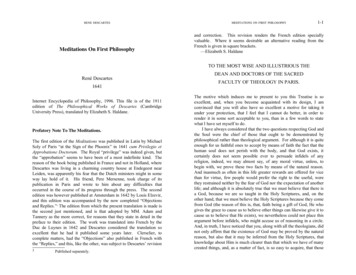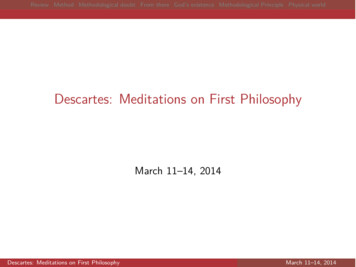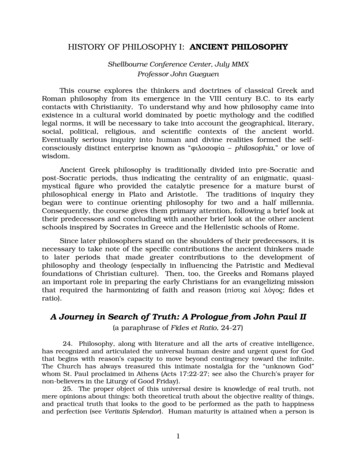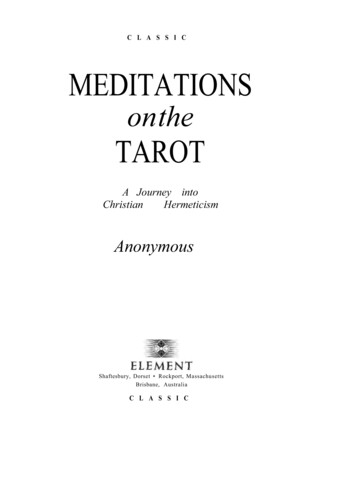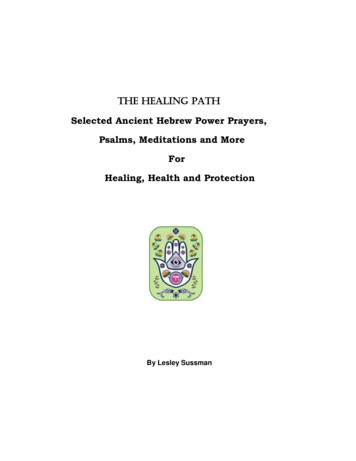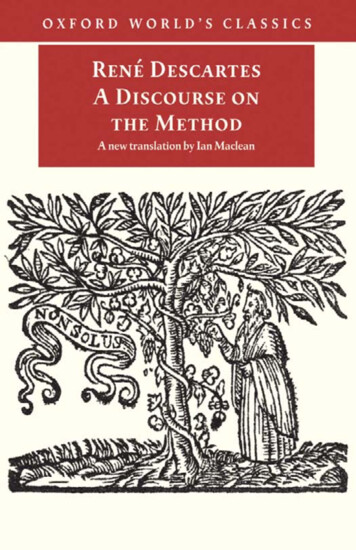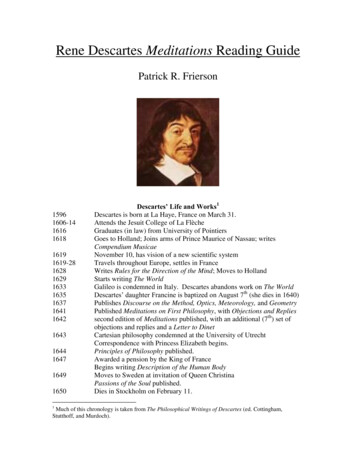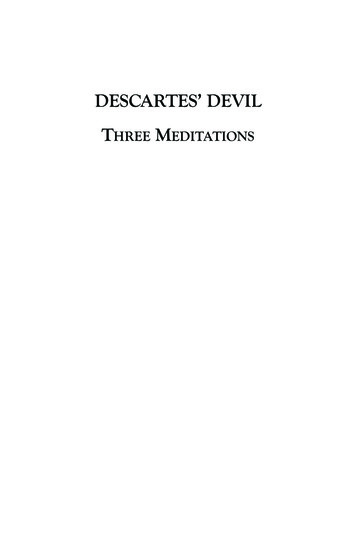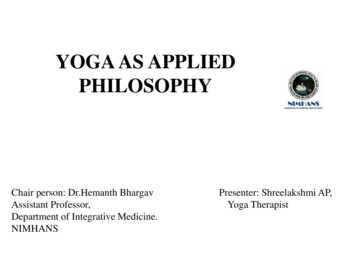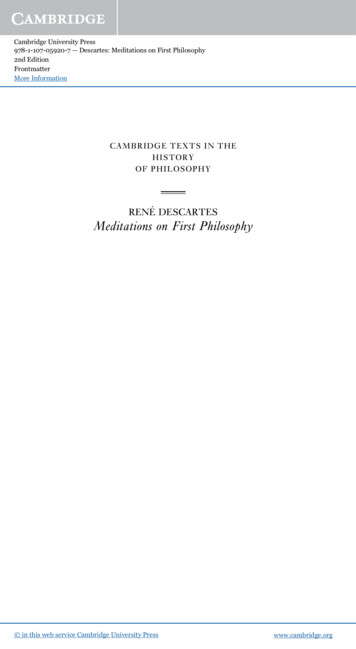
Transcription
Cambridge University Press978-1-107-05920-7 — Descartes: Meditations on First Philosophy2nd EditionFrontmatterMore InformationCAMBRIDGE TEXTS IN THEHISTORYOF PHILOSOPHYRENÉ DESCARTESMeditations on First Philosophy in this web service Cambridge University Presswww.cambridge.org
Cambridge University Press978-1-107-05920-7 — Descartes: Meditations on First Philosophy2nd EditionFrontmatterMore InformationCAMBRIDGE TEXTS IN THEHISTORY OF PHILOSOPHYSeries EditorsKARL AMERIKSProfessor of Philosophy, University of Notre DameDESMOND M. CLARKEEmeritus Professor of Philosophy, University College CorkThe main objective of Cambridge Texts in the History of Philosophy is to expand therange, variety, and quality of texts in the history of philosophy which are available inEnglish. The series includes texts by familiar names (such as Descartes and Kant) andalso by less well-known authors. Wherever possible, texts are published in complete andunabridged form, and translations are specially commissioned for the series. Eachvolume contains a critical introduction together with a guide to further reading andany necessary glossaries and textual apparatus. The volumes are designed for student useat undergraduate and postgraduate level, and will be of interest not only to students ofphilosophy but also to a wider audience of readers in the history of science, the history oftheology, and the history of ideas.For a list of titles published in the series, please see end of book. in this web service Cambridge University Presswww.cambridge.org
Cambridge University Press978-1-107-05920-7 — Descartes: Meditations on First Philosophy2nd EditionFrontmatterMore InformationRENÉ DESCARTESMeditations on First Philosophywith Selections from the Objections and Repliestranslated and edited byJOHN COTTINGHAMUniversity of ReadingSecond Editionwith an introductory essay byBERNARD WILLIAMSand a general introduction byJOHN COTTINGHAM in this web service Cambridge University Presswww.cambridge.org
Cambridge University Press978-1-107-05920-7 — Descartes: Meditations on First Philosophy2nd EditionFrontmatterMore InformationUniversity Printing House, Cambridge cb2 8bs, United KingdomCambridge University Press is part of the University of Cambridge.It furthers the University’s mission by disseminating knowledge in the pursuit ofeducation, learning and research at the highest international levels of excellence.www.cambridge.orgInformation on this title: www.cambridge.org/97801107665736 Cambridge University Press 2017This publication is in copyright. Subject to statutory exceptionand to the provisions of relevant collective licensing agreements,no reproduction of any part may take place without the writtenpermission of Cambridge University Press.First published 1986Reprinted 1987, 1988 (twice), 1989, 1990, 1991 (twice), 1993 (twice)Revised edition with new editorial matter 199621st printing 2015Second edition first published 2017Printed in the United Kingdom by TJ International Ltd. Padstow CornwallA catalogue record for this publication is available from the British LibraryLibrary of Congress Cataloging-in-Publication dataDescartes, René, 1596–1650.[Meditationes de prima philosophia. English] Meditations on first philosophy / René Descartes.With selections from the Objections and replies / [both] translated and edited by John Cottingham;with an introductory essay by Bernard Williams and a new introduction for this edition by JohnCottingham. – Rev. ed. p. cm. – (Cambridge texts in the history of philosophy) Includesbibliographical references and index. isbn 0 521 55252 4 (hardback) isbn 0 521 55818 2 (paperback)1. First philosophy – Early works to 1800. 2. Metaphysics – Early works to 1800. I. Cottingham,John, 1943–. II. Williams, Bernard Arthur Owen. III. Adjunctae sunt variae objectiones – cumresponsionibus authoris. English. Selections. IV Title. V. Series. b1853.E5C6713 1996194–dc20 95–10664isbn 978-1-107-05920-7 Hardbackisbn 978-1-107-66573-6 PaperbackCambridge University Press has no responsibility for the persistence or accuracyof URLs for external or third party internet websites referred to in this publication,and does not guarantee that any content on such websites is, or will remain,accurate or appropriate. in this web service Cambridge University Presswww.cambridge.org
Cambridge University Press978-1-107-05920-7 — Descartes: Meditations on First Philosophy2nd EditionFrontmatterMore InformationContentsIntroductory essay by Bernard WilliamsGeneral introductionChronology of Descartes’s life and worksFurther readingNote on the text and the translationmeditations on first philosophyDedicatory letter to the SorbonnePreface to the readerSynopsis of the following Six Meditationspage viixixxlvxlviil13710First Meditation: What can be called into doubt15Second Meditation: The nature of the human mind,and how it is better known than the body20Third Meditation: The existence of God28Fourth Meditation: Truth and falsity42Fifth Meditation: The essence of material things, and theexistence of God considered a second time50Sixth Meditation: The existence of material things,and the real distinction between mind and body57selections from the objections and replies73On the First Meditation75The rejection of previous beliefs75v in this web service Cambridge University Presswww.cambridge.org
Cambridge University Press978-1-107-05920-7 — Descartes: Meditations on First Philosophy2nd EditionFrontmatterMore InformationTable of ContentsThe reliability of the sensesThe dreaming argumentCertainty in dreamsThe scope of doubt76798081On the Second Meditation83Cogito ergo sum (‘I am thinking, therefore I exist’)Sum res cogitans (‘I am a thinking thing’)The nature of thoughtThe piece of waxDefinitions of ‘thought’, ‘idea’, ‘substance’ etc.On the Third Meditation838590929496Innate ideasThe idea of GodObjective realityGod, author of my existence9698105108On the Fourth Meditation113The cause of errorThe indifference of the willFaith, reason and the natural lightThe rejection of final causes113116117119On the Fifth Meditation121Whether God’s essence implies his existenceEternal truths and GodClear and distinct perception and the ‘Cartesian Circle’On the Sixth Meditation121129130136The real distinction between mind and bodyInteraction between soul and bodyThe immortality of the soulMechanical bodily movement in humans and animalsThe three grades of sensory responseCoherence and memory in waking lifeIndex136149149150151153154vi in this web service Cambridge University Presswww.cambridge.org
Cambridge University Press978-1-107-05920-7 — Descartes: Meditations on First Philosophy2nd EditionFrontmatterMore InformationIntroductory essaybernard williams‘I would not urge anyone to read this book except those who are able andwilling to meditate seriously with me’, Descartes says to his readers inthe Preface (p. 9, below), and he makes it clear that he means theMeditations not to be a treatise, a mere exposition of philosophicalreasons and conclusions, but rather an exercise in thinking, presentedas an encouragement and a guide to readers who will think philosophically themselves. Its thoughts, correspondingly, are presented as theymight be conducted by its author – or rather, as though they were beingconducted at the very moment at which you read them. Indeed, the ‘I’who is having these thoughts may be yourself. Although we are conscious, in reading the Meditations, that they were written by a particularperson, René Descartes, and at a particular time, about 1640, the ‘I’ thatappears throughout them from the first sentence on does not specificallyrepresent that person: it represents anyone who will step into theposition it marks, the position of the thinker who is prepared to reconsider and recast his or her beliefs, as Descartes supposed we might, fromthe ground up.This ‘I’ is different, then, from the ‘I’ that occurs in the Replies to theObjections. (Extracts from both of these also appear in this volume; howthey came to be written is explained by the translator in his Note on thetext, p. xlix.) In the Replies, Descartes speaks straightforwardly forhimself, and the ‘I’ represents the author of the Meditations. The ‘I’ inthe Meditations themselves represents their narrator or protagonist,whom we may call ‘the thinker’. Of course the author has to takevii in this web service Cambridge University Presswww.cambridge.org
Cambridge University Press978-1-107-05920-7 — Descartes: Meditations on First Philosophy2nd EditionFrontmatterMore InformationIntroductory essayresponsibility for the thinker’s reflections. He takes responsibility bothfor the conduct of them and for their outcome, where that includes thebeliefs to which we shall have been led if we are persuaded by thearguments, and also the improved states of mind that the author expectsus to reach by following his work. But the author is not answerable forevery notion entertained by the thinker and for every turn that thereflection takes on the way. The series of thoughts has an upshot orculmination, reached in the Sixth Meditation, and some of the thinker’searlier thoughts have been overcome and left behind in the process ofreaching that final point.Some of those who submitted the Objections found it hard to followthe working out of this idea, and to see how far the thinker had got atvarious points in the process of reflection. It is still hard today, andcommentators’ discussions of the Meditations often take the form ofasking how much at a given stage Descartes takes himself to haveestablished. In such discussions, it is Descartes and his intentions thatcome into question; the modern objectors address themselves, if lessdirectly than the objectors whose texts appear in this volume, to theauthor. It was, after all, Descartes who gave the thinker the directions hefollows. There is a suggestion implicit in the beginning of the work thatthe thinker does not know how it will all turn out: but that is a fiction.To say that it is a fiction is not necessarily to say that in terms of thework itself it is untrue. This might have been a work in which thethinker’s fictional ignorance of how his reflections would turn out wasconvincingly sustained. To some extent it is so, and to that extent, one ofthe gifts offered to the reader by this extraordinary work is a freedom towrite it differently, to set out with the thinker and end up in a differentplace. The rewriting of Descartes’s story in that way has constituted agood deal of modern philosophy.However, it would be wrong to suggest that the Meditations offersno more than an invitation to philosophical reflection, by asking somequestions and showing one way in which they might be answered. Weare expected, rather, to sense the author’s guiding hand throughout.Modern readers may take this for granted too easily, because theyunderestimate Descartes’s intention to engage the reader in the argument. They may think of the Meditations as just a device that Descarteschose to get across the opinions that we now find ascribed to himin histories of philosophy. It is, certainly, a device for convincing us,viii in this web service Cambridge University Presswww.cambridge.org
Cambridge University Press978-1-107-05920-7 — Descartes: Meditations on First Philosophy2nd EditionFrontmatterMore InformationIntroductory essaybut it is more than that, because it aims to convince us by making usconduct the argument ourselves.The first readers of the Meditations may have felt the author’sguiding presence for a different reason, that they were conscious of akind of writing that it resembled. It was, and remains, a very unusualwork, and there had never been a work of philosophy presented in sucha form before. But there did exist, familiarly, works of religious meditation, and Descartes’s book self-consciously resembles them. Likemany of them, it is ostensibly divided between days of contemplationand, again like them, it encourages and helps the reader to overcomeand get rid of misleading and seductive states of the soul, so as to arriveat an understanding of his or her own nature and of a created being’srelations with God.Those who wrote religious meditations were acting as guides to aspiritual discipline. Descartes’s work gives his readers guidance in anintellectual discipline, and helps them to discover in themselves pureintellectual conceptions – of matter, of mind and of God – from whichthey will be able to form a true and unclouded understanding of theworld. The inquiry in which he leads them does indeed yield a conviction of the existence of God. There is no reason at all to suppose thatDescartes was insincere in these religious affirmations (though theoriesthat ascribe to him complex strategies of deceit have a strange capacity tosurvive.) What is true is that the thoughts that lead to these conclusionsare not in the least religious in spirit, and God’s existence is establishedas a purely metaphysical conclusion. Anything to do with a religious lifeor, indeed, with any distinctively religious aspects of life, will have tocome in after Descartes’s reflections are over. The Meditations, thoughthey have an analogy to traditional meditations that belong to the religious life, assuredly do not belong to it themselves.A still greater difference lies in the authority with which the two kindsof works were offered. The authors of religious meditations claimedauthority from their own experience, but also, most often, from a religious office. Descartes does not suppose that his right to claim a reader’sattention lies in any sacramental, traditional or professional position. Hisauthority to show us how to think lies only in this, that he has himself, ashe supposes, uncovered methods of simple, clear-headed and rationalinquiry which all reasonable people can conduct if they clear their mindsof prejudice and address themselves in a straightforward way to theix in this web service Cambridge University Presswww.cambridge.org
Cambridge University Press978-1-107-05920-7 — Descartes: Meditations on First Philosophy2nd EditionFrontmatterMore InformationIntroductory essayquestions. No special training, no religious discipline, no knowledge oftexts or of history is needed in order to do this. He was disposed tothink, in fact, that such things could be an actual obstacle.His justification for believing that his readers had these powers, if onlythey could use them, is to be found in the Meditations themselves. If wefollow Descartes to the end of them and accept his considerations, weshall have come to a conception of ourselves as rational, immaterial selvesborn with pure intellectual ideas and a capacity for reasoning whichenable us to grasp in basic respects the nature of the world. Each of usdoes indeed exist in some kind of union with a particular physical body.‘My body’, one says, and Descartes took this phrase to register aprofound truth, that what one truly is, is a mind ‘really distinct’ fromthe body. We need sensory information provided through the body notonly to survive in the material world, but to find out particular scientificlaws. But our own nature, the existence of God and indeed the mostabstract structural features of the physical world itself can be discovered,Descartes supposed, by directed intelligence and rational insight.Among these things we discover, when we direct our intelligence inthe right way, is that we are beings who are capable of making just suchdiscoveries, and we gain insight into the way in which we can makethem. So we discover also how the Meditations, a work of pure reflectionaiming to free us from error and to help us understand these basicmatters, can succeed. Its end lies in its beginning, not just because itsauthor knows how the thinker will come out, but in the philosophicalsense that if we undertake to follow its method of inquiry, our doing so,Descartes supposed, is justified by our being the kind of creatures that itfinally shows us to be.The method deployed and invoked in the Meditations works, to animportant degree, through argument, clear chains of reasoning. Thistells us something of how to read the book. We are asked to argue, notmerely through it, but with it. Because of this, it is specially appropriatethat the book was associated, at its first publication, with Objections andReplies. Descartes had some political motives in having the Objectionsassembled, as he also did in dedicating the book to the Sorbonne. Hewanted to have his work accepted by the religious authorities. For thesame reason, he did not welcome all the Objections that were collected byhis friend Mersenne, who organised the enterprise, being embarrassedin particular by those of the English sceptic and materialist Hobbes.x in this web service Cambridge University Presswww.cambridge.org
Cambridge University Press978-1-107-05920-7 — Descartes: Meditations on First Philosophy2nd EditionFrontmatterMore InformationIntroductory essayBut whatever the strategy of the publication, it was true to the spirit ofthe work, as Descartes clearly believed, that it should appear togetherwith arguments attempting to refute it or defend it.If we are to read the Meditations properly, we must remember that thethinker is not simply the author. We must not forget that the work is acarefully designed whole, of great literary cunning, and that it rarely laysout arguments in a complete or formal way. But this does not mean thatit is not sustained by argument, or that arguing with it is inappropriate. Itmeans only that we must read it carefully to find out what its argumentsare, and what Descartes is taking for granted. If we reflect on what he istaking for granted or asking us by implication to accept, we are doingpart of what he invited us to do, when he asked us to meditate with him.A question of what he is taking for granted presents itself right at thebeginning. ‘Reason now leads me to think’, he writes in the FirstMeditation (p. 15, below)that I should hold back my assent from opinions which are notcompletely certain and indubitable just as carefully as I do fromthose which are patently false. So, for the purpose of rejecting allmy opinions, it will be enough if I find in each of them at least somereason for doubt. And to do this I will not need to run throughthem all individually. . . Once the foundations of a building areundermined, anything built on them collapses of its own accord;so I will go straight for the basic principles on which all my formerbeliefs rested.Why does reason now lead him to think this? Everyone is engaged intrying to get information about matters of concern to him; some, such asDescartes, are involved in the sciences and want to arrive at systematicand reasoned beliefs about nature. But no one ordinarily supposes thatthe rational way to start on these things is to throw away or lay aside allthe information one thinks one already has. Descartes thinks not onlythat this is the right course for him, but that it is self-evidently the rightcourse for him. Why should he think this? Why should doubt seem thepath to knowledge, if there is a path to knowledge at all?We must notice first that the approach is not supposed to be appliedto the ordinary affairs of life. Descartes makes that point over and overagain, saying for instance that we must distinguish between ‘the actionsof life’ and ‘the search for truth’; and in the Synopsis to the Meditationsxi in this web service Cambridge University Presswww.cambridge.org
Cambridge University Press978-1-107-05920-7 — Descartes: Meditations on First Philosophy2nd EditionFrontmatterMore InformationIntroductory essay(p. 13, below) he is prepared to use such a distinction even to define whatcounts as serious: ‘no sane person has ever seriously doubted thesethings’. He does not mean that the results of his reflections will notaffect ordinary practice or the conduct of the sciences. On the contrary,this is what he hopes they will do, setting the sciences, for instance, onthe right path. Nor does he think that these reflections are a trivial way ofpassing the time. They cannot be that, if eventually they could havethese practical and scientific effects. He may think that it is particularlyhis own, the author’s, use of the Doubt that will have those effects, buthe also believes that it is a worthwhile exercise for any of us, once in alifetime, to take temporarily the position of the thinker of such reflections, and this will not be a trivial undertaking, either. Indeed, he himselfsaid that the meditation to which he invited us in the Preface was itself,in its own way, ‘serious’.When Descartes says that the thoughts deploying the Doubt are to beseparated from practical life, and in that sense (but only in that sense) arenot ‘serious’, he is defining a special kind of intellectual project which byits nature can be conducted only if it is separated from all other activities.In ordinary life, when we want the truth on a subject, we pursue it,necessarily, in a context of other things that we are aiming to do,including other inquiries we need to make. The pattern of our inquiriesis formed by many constraints on how we can spend our time andenergies, and by considerations of what we risk by failing to look intoone thing or spending too long looking into another. These constant andoften implicit calculations of the economics of inquiry help to shape thebody of our beliefs; and they have the consequence that our beliefs, whilethey aim at truth, will, inevitably, only partly achieve it. Descartesconceived of a project that would be purely the search for truth, andwould be unconstrained by any other objectives at all. Because it temporarily lays aside the demands of practical rationality, it has to bedetached from practice; and because it is concerned with truth andnothing else, it has to raise its requirements to the highest conceivablelevel, and demand nothing less than absolute certainty.The search has to take place out of this world, so to speak, and itsnature, its internal purpose, explains why this should be. But there is stilla question about its external purpose. Why should Descartes or anyoneelse, once in a lifetime, take time out of the world to pursue this project?Descartes can commend it to us in more than one way, but his ownxii in this web service Cambridge University Presswww.cambridge.org
Cambridge University Press978-1-107-05920-7 — Descartes: Meditations on First Philosophy2nd EditionFrontmatterMore InformationIntroductory essayprincipal reason is that he is looking for what he calls, at the start of theFirst Meditation and in many other places, ‘foundations’ of knowledge.To serve this purpose, the Doubt has to be methodical. A refusal to takethings for granted that might be doubtful is part of Descartes’s generalintellectual method, which he had introduced in his earlier work TheDiscourse on the Method; the Doubt is an extreme application of that idea,conditioned by the circumstances of the special project, the radicalsearch for certainty. The Doubt is deployed for defined purposes, andfrom the start it is under control.It was not a new idea that scepticism might be used for its beneficialeffects. Sceptics in the ancient world, Pyrrhonians and others, hadadvocated such techniques for their own purposes; their teachings hadbeen revived since the Reformation, and sceptical views were in the air atthe time that Descartes wrote. Some of his critics complained thatmaterial he deployed, for instance about the errors of the senses, wasold stuff. But Descartes could rightly reply that while scepticism was nonew thing, his use of it was indeed new. When the Pyrrhonians deployedsceptical considerations, it was in order to calm and eradicate an unsatisfiable urge for knowledge; and it was rather in this spirit, sixty yearsbefore the Meditations, that Montaigne had written. But Descartes’s aimwas precisely the opposite, to use scepticism to help in acquiring knowledge, and to bring out from a sceptical inquiry the result that knowledgewas, after all, possible. The Doubt served that purpose by eliminatingfalse conceptions; and the fact that it was possible to use it in this wayand then overcome it gave the fundamental reassurance that a properscience would have nothing to fear from the doubts of the sceptics.Descartes’s Doubt was to be both revelatory and pre-emptive.‘Foundations of knowledge’ can mean more than one thing. Descarteshas often been thought to be searching for foundations in the sense ofaxioms from which the whole of knowledge or, more particularly, thewhole of science, might be deduced, as in a geometrical system. In fact,this is rarely his concern, and it does not represent his understanding ofwhat a completed science would be like. Historians classify Descartes asa ‘rationalist’, but this should not be taken to mean that he supposedmere rational reflection to be enough to establish scientific conclusions.He was a rationalist, rather, in his views about the origins of scientificconcepts. He thought that the terms in which physics should describe theworld were given to rational reflection, and he supposed them to be, inxiii in this web service Cambridge University Presswww.cambridge.org
Cambridge University Press978-1-107-05920-7 — Descartes: Meditations on First Philosophy2nd EditionFrontmatterMore InformationIntroductory essayfact, purely mathematical. It was only by empirical investigation andexperiment, however, that we could discover which descriptions,expressed in those terms, were true of the actual world.Basically, the Doubt provides foundations for knowledge because ithelps to eliminate error. Descartes’s aim was not so much to find truthsfrom which all scientific knowledge could be deduced, but rather toidentify false or doubtful propositions which were implied by oureveryday beliefs and so made those beliefs themselves unreliable. Onebelief of this kind was that objects in the external world had just thequalities that they seem to have, such as colour. The Doubt helped ineliminating this very general error, which could then be replaced by thesound conviction that objects, in themselves, had only the propertiesascribed to them by mathematical physics. Once this corrected view hadbeen laid bare and found indubitable in the process of orderly reflection,it could from then on serve as a sound foundation of our understandingof the world.Proceeding in this way, Descartes could indeed ‘go straight for thebasic principles on which all my former beliefs rested’. The workings ofthe Doubt are adjusted to these aims. In its most extreme, ‘hyperbolical’,form, the Doubt is embodied in the fiction (p. 19) that a maliciousdemon, ‘of the utmost power and cunning has employed all his energiesin order to deceive me’. This device provides Descartes with a thoughtexperiment that can be generally applied: if there were an indefinitelypowerful agency who was misleading me to the greatest conceivableextent, would this kind of belief or experience be correct? Thinking inthese terms, Descartes is led to identify whole tracts of his ordinaryexperience he may lay aside, so that he suspends belief in the whole ofthe material world, including his own body.It is significant, however, and characteristic of the way in which theMeditations unfolds, that Descartes does not start his sceptical inquirywith this extreme device. We are invited to get used to sceptical thinkinggradually, by considering first more familiar and realistic occasions oferror. He starts with illusions of the senses, in which we mistake theshape of a distant tower, for instance, or suppose a straight stick, partlyin water, to be bent. Such examples remind us that we can be mistaken,and that even by everyday canons the world need not really be as itpresents itself to our perception. There is little in these cases, however,to encourage the more generally sceptical idea that on any given occasionxiv in this web service Cambridge University Presswww.cambridge.org
Cambridge University Press978-1-107-05920-7 — Descartes: Meditations on First Philosophy2nd EditionFrontmatterMore InformationIntroductory essaywhen we take ourselves to be perceiving something, we may be mistaken.He thinks that we are led to that further and more radical idea byreflection on the ‘errors of our dreams’. The phenomenon of dreamingcreates a more general and more puzzling scepticism because, first, it istrue (or at least the sceptic pretends that it is true) that anything we canperceive we can dream we perceive; and, second, there is no way oftelling at the time of dreaming whether we are dreaming or not. So itseems that at any moment I can ask ‘how do I know that I am notdreaming now?’, and find it hard to give an answer. But what I can do, atany rate, if the question has occurred to me, is to ‘bracket’ these experiences, and not commit myself on the question of whether they arewaking experiences which are reliable, or dreams which are delusive.Once I am prepared to do this, I am well started on the scepticaljourney. So far I have reached only the distributive doubt, on anyoccasion I may be mistaken, but reflecting on the possibility that I canhave a set of experiences that do not correspond to anything real, I amnearly ready to take the step, with the help of the malicious demon, tothe final and collective doubt, I may be mistaken all the time. In hisdescription of what dreams are Descartes already lays the ground forwhat is to come. In the Sixth Meditation (p. 61) he says that he did notbelieve that what he seemed to perceive when he was dreaming came‘from things located outside me’. In an everyday sense, certainly, thatdescription of a dream must be correct. But the description has acquiredsome large implications by the time I reach the last Meditation, and,having accepted the ‘real distinction’ between mind and body, understand that my body is itself something ‘outside me’.Every step in the sceptical progress should be questioned. It is at thebeginning t
Meditations often take the form of asking how much at a given stage Descartes takes himself to have established. In such discussions, it is Descartes and his intentions that come into question; the modern objectors address themselves, if less directly than the ob
